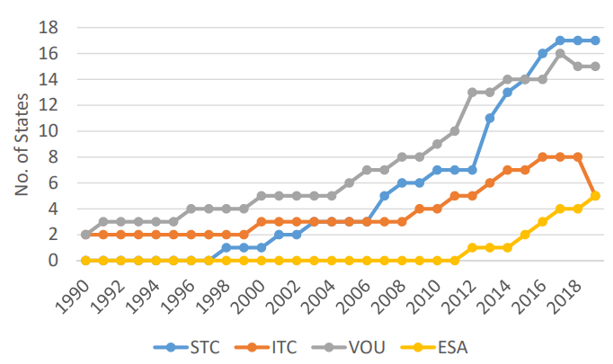 A new study from a professor of economics in the Gatton College of Business and Economics at the University of Kentucky finds positive correlation between states’ K-12 student achievement and their education choice policies.
A new study from a professor of economics in the Gatton College of Business and Economics at the University of Kentucky finds positive correlation between states’ K-12 student achievement and their education choice policies.
According to the paper, “Enhancing economic freedom via school choice and competition: Have state laws been enabling enough to generate broad-based effects?” released in early May, states with school choice programs saw large improvements in statewide test scores.
The report follows a study released earlier this year from Patrick J. Wolf, Jay P. Greene, James D. Paul and Matthew Ladner that shows similar results.
“This paper’s basic findings indicate strikingly large fourth grade reading and math test score gains for states that have adopted voucher programs and/or Education Savings Accounts,” wrote the researcher, John Garen.
The study shows that charter schools produced positive test score improvements, though only if the state’s enabling charter school law was not deemed “restrictive.”
Additionally, Garen found that increases in per-pupil spending correlated with improved test scores, but this impact was significantly smaller than offering a voucher or education savings account.
The paper compared National Assessment of Educational Progress (NAEP) scores from 1992 to 2019 and to the availability of school choice programs and the restrictions on student eligibility, as well as scholarship funding. However, the research did not include home education or district open enrollment policies in the results.
The study also considers whether school choice laws permit or restrict enrollment and new school entry, total public school per-pupil spending, and adjusts for the student’s race, income and learning disability status.

The number of states offering private school choice programs has grown steadily over the last two decades. (Scholarship Tax Credit (STC), Individual Tax Credit (ITC), Voucher (VOU), Education Savings Account (ESA))
According to Garen, for every $1,000 increase in per-pupil spending, there was a corresponding increase of 0.25 points in reading and 0.14 in math.
States with charter schools, however, saw decreases in both math and reading scores, but this may be impacted by restrictive charter school laws. States with less restrictive charter school laws, which would allow more students and schools, saw an increase of 0.65 points on the NAEP, the equivalent of increasing per-pupil spending by $2,500.
A statewide voucher program improved reading by 2.25 points, and the education savings account improved reading scores by 3.46 points, an effect that is 13 times stronger than simply increasing per-pupil spending.
Math scores also improved significantly in states with voucher and ESA programs. According to the researcher, the effect of an ESA program on statewide math scores was 27 times stronger than increasing per-pupil spending by $1,000.
States with ESA programs observed in the study include Arizona, Mississippi, North Carolina, Tennessee, and Florida.
Here are some additional findings:
According to Garen, vouchers and education savings accounts were better funded than tax credit scholarships but funded less than traditional public schools.
“Such programs,” the research concludes, “are associated with large improvements in Grade 4 reading and math NAEP test scores and are much bigger than the effect of school funding. Moreover, they are associated with lower school costs, implying a double dividend of better outcomes at lower cost.”
The report was published May 1.